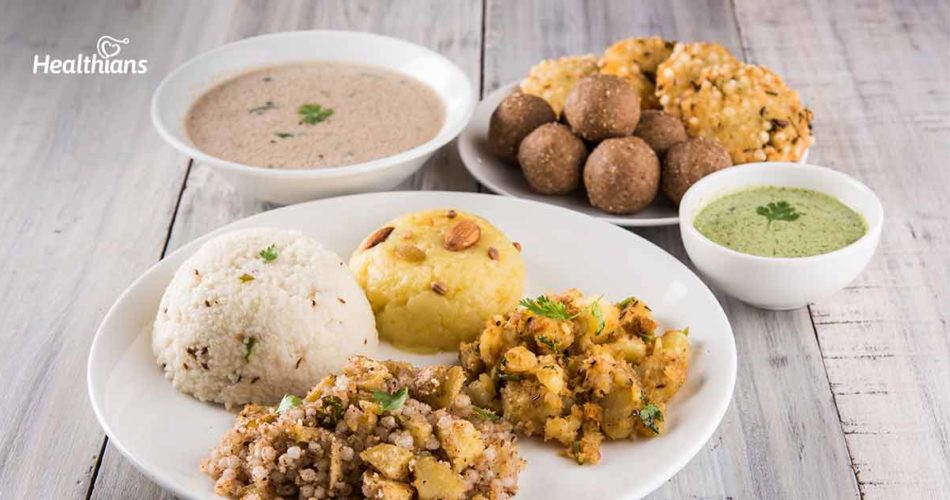Contributed by: Healthians Team
Introduction
Navratri is a nine-day festival and the beginning of the festival season in India. During this period, people show their devotion by fasting and worshipping all nine forms of Goddess Durga for nine days.
The nine-day fasting helps in the detoxification of the body. The fasting duration differs from person to person, as some people fast all nine days, while others may fast only on the first and the last day.
This nine-day fasting is extremely beneficial for health as the food items allowed during the fasting are light, easily digestible, and highly nutritious. If the rules of fasting are followed appropriately, it can even help shed some extra kilos and revitalize the system.
In this article, you will learn about what you should eat and avoid while fasting and the risks associated with fasting.
The basic concept of fasting is to eat less and eat right. Some people, however, gormandize and defeat the basic idea of fasting. Based on some research studies, here’s a quick rundown on the benefits of fasting, if done correctly.
- Improves heart functions
- Helps regulate and maintain a healthy blood pressure
- Helps maintain healthy cholesterol levels
- Aids in managing and preventing thyroid disease
- Maintains a healthy body weight
- Reduces the production of inflammatory substances
- Maintains healthy blood sugar levels and manage diabetes
- Reduces hypertension
- Improves digestion
- Boosts immunity
Eating tips while fasting
Avoid regular flour and grains
People should not consume regular grains like wheat and rice while fasting. Some healthy alternates to these grains are:
- Buckwheat flour (Kuttu ka atta): It is rich in fibre and increases the speed of metabolism. There are several other advantages of consuming buckwheat flour, such as maintaining a healthy weight, promoting gut health, improving bone strength, and enhancing hair & skin health. People suffering from diabetes can include buckwheat flour in their regular eating practices, as it helps in maintaining healthy insulin levels.
- Water chestnut flour (Singhara ka atta): It is rich in nutrients like protein, fibre, manganese, potassium, vitamin B6, copper, iron, calcium, and zinc. Thus, consuming water chestnut flour helps in maintaining a healthy weight, boosts immunity, nourishes the body, and keeps you energised for a long time.
- Amaranth flour (Rajgira aata): Amaranth flour is a great source of nutrients like protein, fibre, calcium, phosphorus, magnesium, iron, folate, and selenium. Eating Amaranth flour offers several health benefits which include weight loss, protects against cancer, fights inflammation, promotes bone health, builds muscle strength, improves digestion, and heart health.
- Barnyard millet (Samak ke chawal): Barnyard millet is a great source of easily digestible protein and contains fewer calories than regular white rice. It is rich in fibre, iron, is gluten-free, and has a low glycemic index, which makes it good for people with diabetes.
Eat more fruits
Fruits come in a variety of shapes and sizes and are rich in numerous nutrients. All kinds of fruits and nuts can be consumed while fasting, but seasonal fruits are more beneficial than non-seasonal ones.
Vegetables
Vegetables that can be eaten during Navratri fast include potato, sweet potato, pumpkin, arbi, raw banana, raw papaya, bottle gourd (lauki), tomatoes, ginger, lemon, elephant yam (suran), cucumber, and carrots. These vegetables are rich in numerous vitamins & minerals and promote overall well-being. Vegetables that should be avoided during Navratri include onion, garlic, leek (green onion), and mushrooms.
Milk & dairy products
People who are fasting can also have dairy products like milk, paneer, white butter, clarified butter (ghee), khoya, yoghurt, and buttermilk. Dairy products are rich in nutrients such as calcium, potassium, vitamin D, and protein and help in building and maintaining strong bones.
Salt & spices
Table salt (white salt) is prohibited during Navratri. Alternative to table salt that can be consumed while fasting is rock salt (sendha namak). Some other spices like cumin, ajwain, cinnamon, green cardamom, cloves, black pepper, red chilli powder, and dry pomegranate seeds can also be taken during Navratri fasting.
Risks associated with fasting
Fasting has several benefits for the overall well-being, however, there are a few risk factors associated with fasting, which include:
- Diabetes patients who take insulin can have severely low blood sugar levels
- Some people fast without water which can give rise to complications like severe dehydration, exhaustion, electrolyte imbalance, heatstroke, headaches, and kidney ailments
- Fasting can also trigger migraine attacks
Final thoughts
Navratri is an auspicious occasion celebrated throughout the country with great delight. Most of the people who celebrate this occasion show their devotion by keeping fast and worshipping the goddess Durga. The aforementioned foods that people usually have while fasting provides several health benefits like boosting immunity and detoxification.
But fasting can be quite harmful to people with existing health complications like Type-2 diabetes. So if you have any existing health complications, we recommend you consult with your doctor before fasting to avoid any further health complications.
Also, regular health screening gives you a comprehensive insight into your overall well-being, thus enabling you to take preventive measures for a healthy and fulfilling life.




